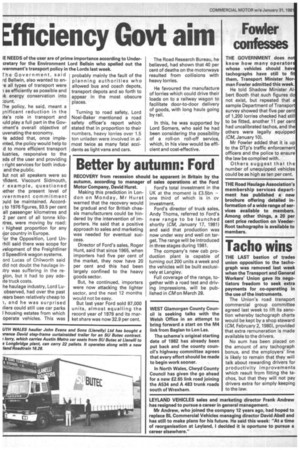Efficiency Govt aim
Page 6

If you've noticed an error in this article please click here to report it so we can fix it.
IE NEEDS of the user are of prime importance according to Undercretary for the Environment Lord Bellsin who spelled out the ivernment's transport policy in the Lords last week.
The Government, said rd Bellwin, also wanted to en-e all types of transport were as efficiently as possible and )k energy conservation into
Ihe policy, he said, meant a mificant reduction in the Ite's role in transport and luld play a full part in the Goviment's overall objective of uvenating the economy.
-le added that, once imple)nted, the policy would help to d to more efficient transport lustries, responsive to the ads of the user and providing ) right services for both Indusand the public.
3ut not all speakers were so Tfident. Viscount Sidmouth,
r example, questioned lether the present level of svernment commitment )uld be maintained. AccordIto 1976 figures, 93.5 per cent all passenger kilometres and 2 per cent of all tonne kilo)tres, were moving by road: ) highest proportion for any ijor country in Europe.
or the Opposition, Lord Unrhill said there was scope for velopment of the Freightliner Speedl ink wagon systems. ord Lucas of Chilworth said did not doubt the haulage intry was suffering in the reion, but it had to pay adeite truck costs.
he haulage industry, Lord Luobserved, had over the past rears been relatively cheap to 1, and he was surprised iliers could still use car parks I housing estates from which operate vehicles. This was probably mainly the fault of the planning authorities who allowed bus and coach depots, transport depots and so forth to appear in the most obscure places.
Turning to road safety, Lord Noel-Baker mentioned a road safety officer's report which stated that in proportion to their numbers, heavy lorries over 1.5 ton unladen were involved in almost twice as many fatal accidents as light vans and cars. The Road Research Bureau, he believed, had shown that 40 per cent of deaths on the motorways resulted from collisions with heavy lorries.
He favoured the manufacture of lorries which could drive their loads on to a railway wagon to facilitate door-to-door delivery of goods, with long hauls going by rail.
In this, he was supported by Lord Somers, who said he had been considering the possibility of a roll-on roll-off service, which, in his view would be efficient and cost-effective.




























































































